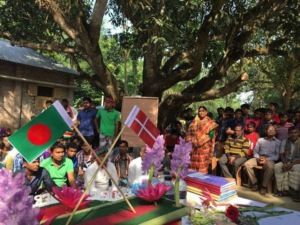News
Denmark to play big role in Bangladesh’s green transition
This article is more than 9 years old.
World’s second-largest textile industry could benefit from Danish sustainable solutions

Closer-knit ties (photo: Danish Embassy in Bangladesh)
With Bangladesh’s massive textile industry embracing a more sustainable future, Denmark is poised to play a significant role in the green transition of the nation’s biggest industry.
An increasing number of brands are favouring factories which invest in energy efficiency, water reduction and recycling, sustainable energy and other green technologies, according to the Danish Trade Council in Dhaka (DTCD).
“After the Rana Plaza factory collapse tragedy, there has been immense focus on improving the conditions of the textile industry in Bangladesh,” said Søren Robenhagen, the commercial counsellor of DTCD.
“In terms of building and fire safety, but also in regards to worker conditions and sustainability. That has resulted in there now being 36 factories that have been LEED certified by the United States Green Building Council, with 195 expected to follow suit in 2017.”
READ MORE: Denmark eyeing closer bonds with Bangladesh
Train about to leave
The DTCD has established a project that aims to connect Danish green tech solutions to the Bangladeshi textile industry. With support from Denmark’s development co-operation, DANIDA, the DTCD is planning for a Danish delegation to undertake a fact-finding trip to Bangladesh in February 2017.
“Energy efficiency, water cleansing and sustainable energy are exactly the areas in which Danish companies have great knowledge and are leaders in regards to effective and high quality green solutions,” said Robenhagen.
“Bangladesh isn’t an easy country to operate in, but with assistance from the embassy in Dhaka there are certainly possibilities to gain access to many opportunities. You need to jump on the train now if you want to be part of the strong growth that the industry will see over the next couple of years.”
The textile industry is by far the largest industry in Bangladesh, accounting for over 80 percent of the nation’s export. The country’s more than 5,000 textile factories employ over 4.2 million people and is second in the world to only China’s textile industry.










































